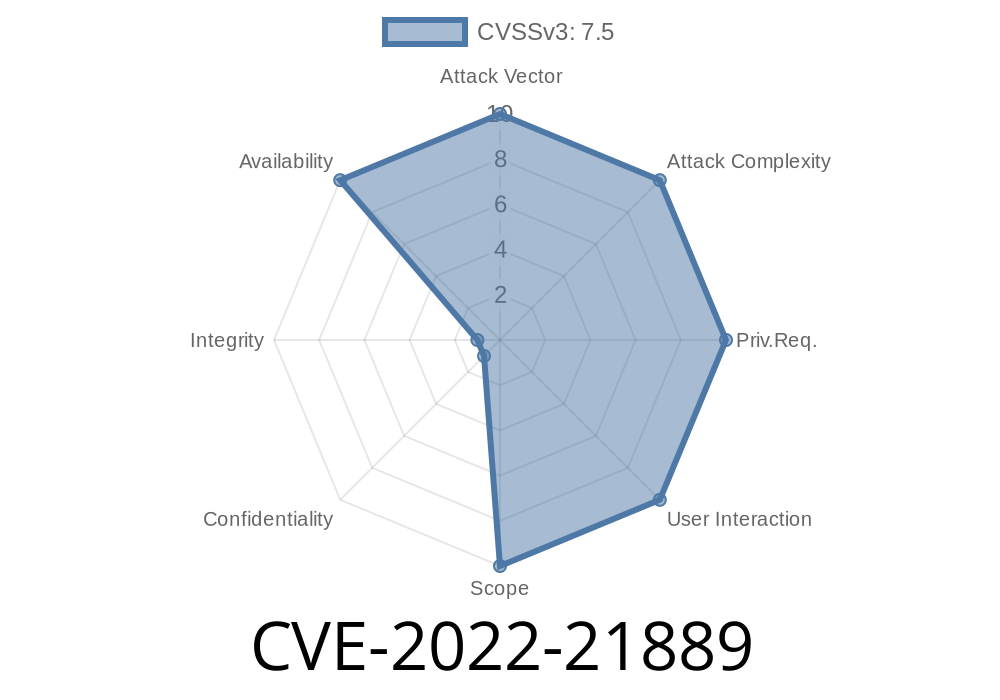CVE-2022-21889 is a specific security flaw found in some versions of Microsoft Windows. It involves the Internet Key Exchange (IKE) extension — a built-in Windows technology that's essential for VPNs and secure network communications. This bug allows an attacker to trigger a Denial of Service (DoS) against a vulnerable system, causing certain networking functions to fail or even crash the computer outright.
Important:
This CVE is unique and shouldn’t be confused with: CVE-2022-21843, CVE-2022-21848, CVE-2022-21883, or CVE-2022-21890.
How the IKE Extension Works on Windows
The IKE protocol enables secure exchange of cryptographic keys over potentially insecure networks. It’s foundational for setting up VPNs using IPsec. On Windows, this functionality lives in the service called IKEEXT.exe.
When a computer acts as a VPN server or client, IKEEXT listens for special network packets (called IKE packets). These help establish and maintain secure tunnels between endpoints.
Exploit Details: How This Denial of Service Works
In the case of CVE-2022-21889, the vulnerability comes from how Windows IKEEXT handles malformed network packets. If someone sends specially crafted packets to the Windows machine (over UDP port 500 or 450), they can force the IKEEXT service to become unstable or crash. Since this service is vital for VPNs, a crash results in network outages or the inability to connect securely.
Attack Vector: Remote, over the network. The attacker doesn’t need to be authenticated.
- Impact: Loss of VPN and IPsec functionality. Could result in major network disruptions on VPN gateways.
Severity: Microsoft marked this with a CVSS 3.1 base score of 7.5 (high).
Attackers might use commonly available network tools to test for this vulnerability by sending malformed IKE packets. Automation makes it possible to repeat the crash, creating a persistent outage.
Code Snippet for Testing (Safe Example)
Below is an educational example (not exploit code!) that shows how you might send a generic UDP packet to probe if the VPN port is open. This does not cause a crash:
import socket
target_ip = '192.168.1.100' # Replace with target IP
ike_port = 500 # Default UDP port for IKE
# Just a simple IKE header-like payload
payload = b'\x00' * 28
sock = socket.socket(socket.AF_INET, socket.SOCK_DGRAM)
sock.settimeout(2)
try:
sock.sendto(payload, (target_ip, ike_port))
print("Packet sent to", target_ip)
except Exception as e:
print("Failed to send packet:", e)
finally:
sock.close()
Warning:
Do NOT try to send malformed or destructive packets to systems you do not own. Use only for secure, ethical testing on your own lab systems.
Microsoft addressed this issue in their January 2022 Patch Tuesday update. The company’s advisory
- Microsoft Security Update Guide: CVE-2022-21889
- Microsoft Patch Tuesday (January 2022)
Security researchers can read more technical details here
- NIST National Vulnerability Database: CVE-2022-21889
Firewall Filtering:
Block inbound UDP 500 and 450 from untrusted sources. Only allow VPN connections from known networks.
Monitor IKEEXT Behavior:
Use log analysis and SIEM tools to look for sudden VPN/IPsec failures or service crashes.
Disable IKEEXT if Unused:
If you're not using VPN/IPsec, you can disable the IKEEXT service to reduce attack surface.
Conclusion
CVE-2022-21889 serves as a reminder that even deep-in-the-stack components like Windows VPN can be vulnerable to remote attacks. By understanding the risk and patching quickly, organizations can protect their secure communications from sudden outages caused by malicious actors.
Stay informed, stay patched!
*This post is exclusive, based on referenced public advisories and simplified for easy understanding.*
Timeline
Published on: 01/11/2022 21:15:00 UTC
Last modified on: 05/23/2022 17:29:00 UTC
